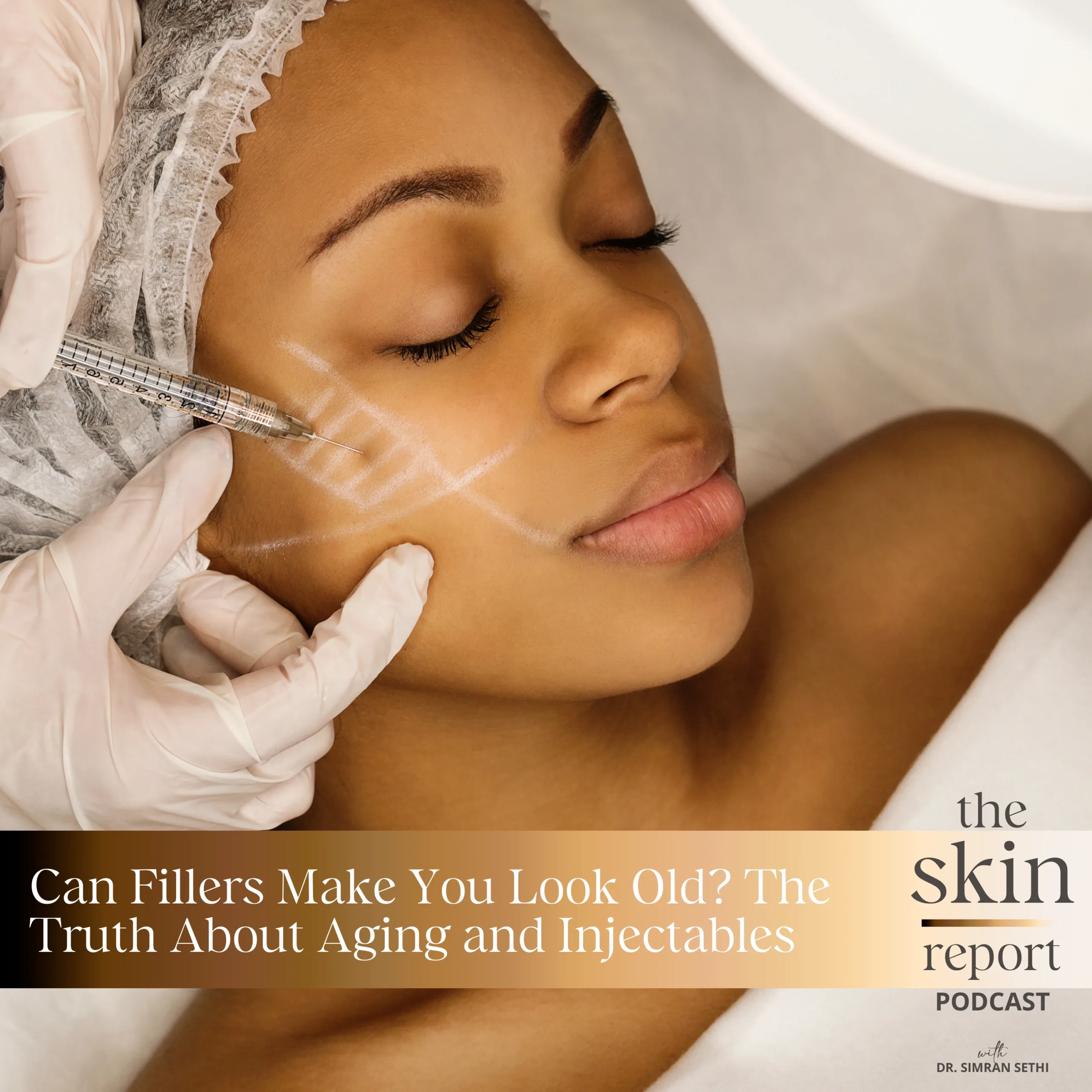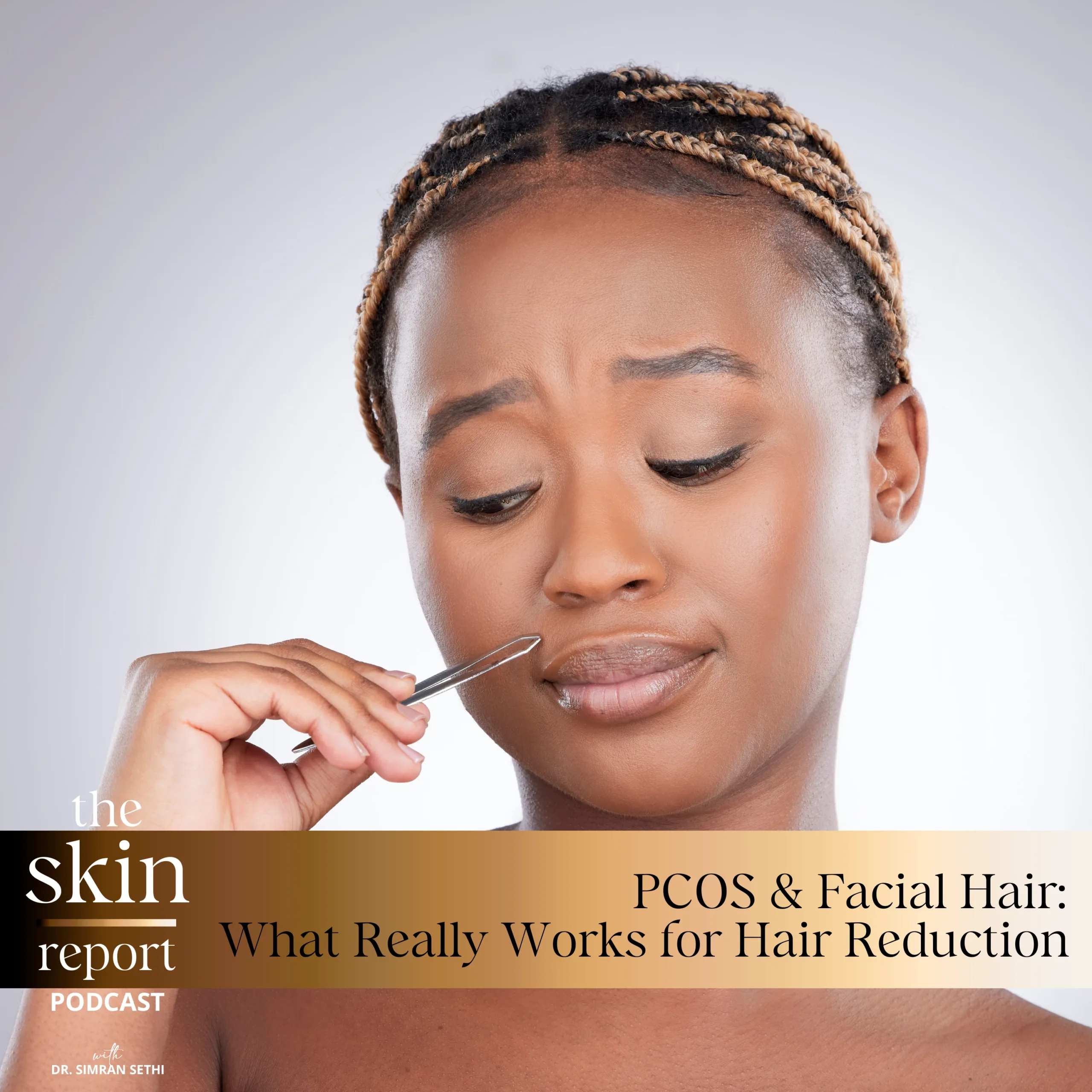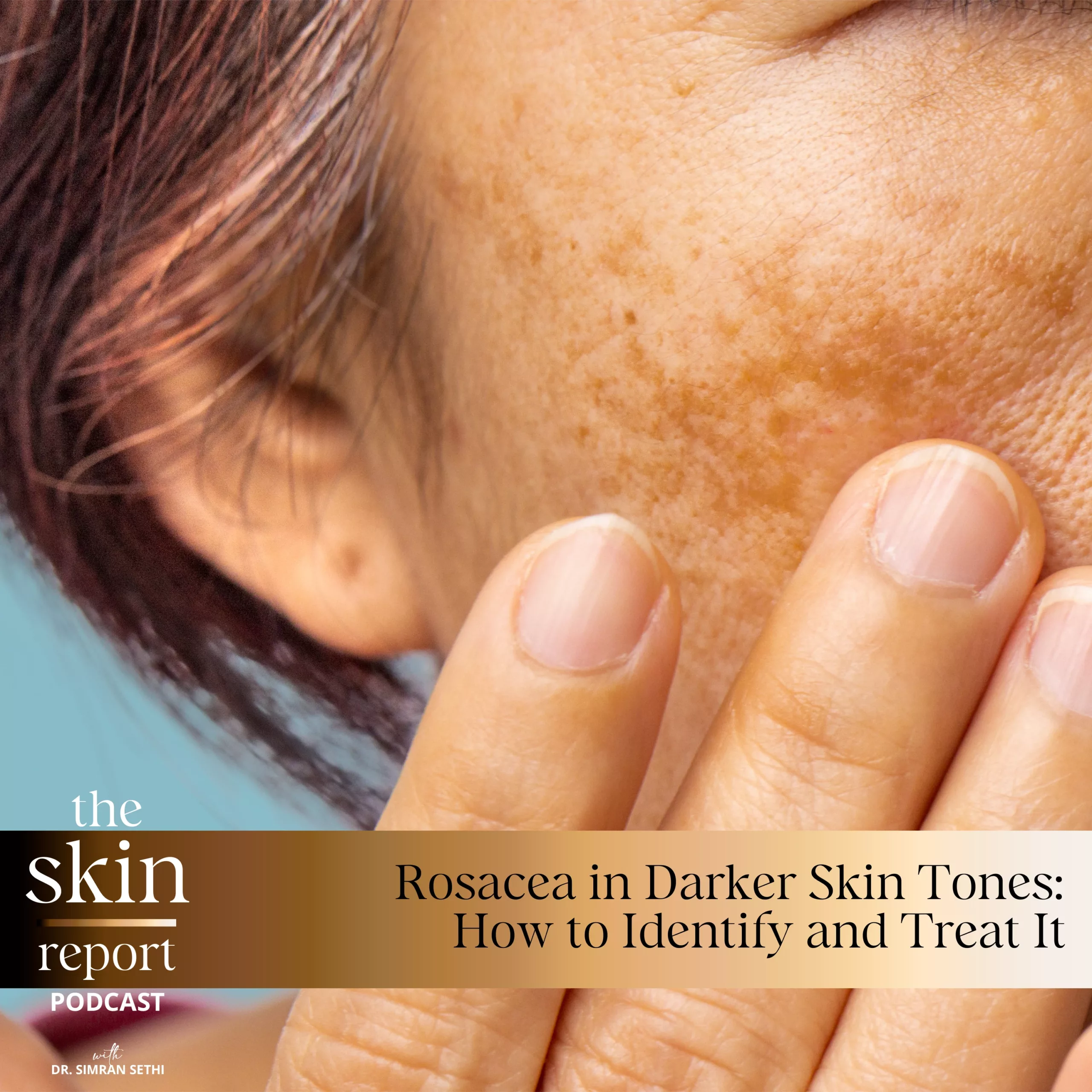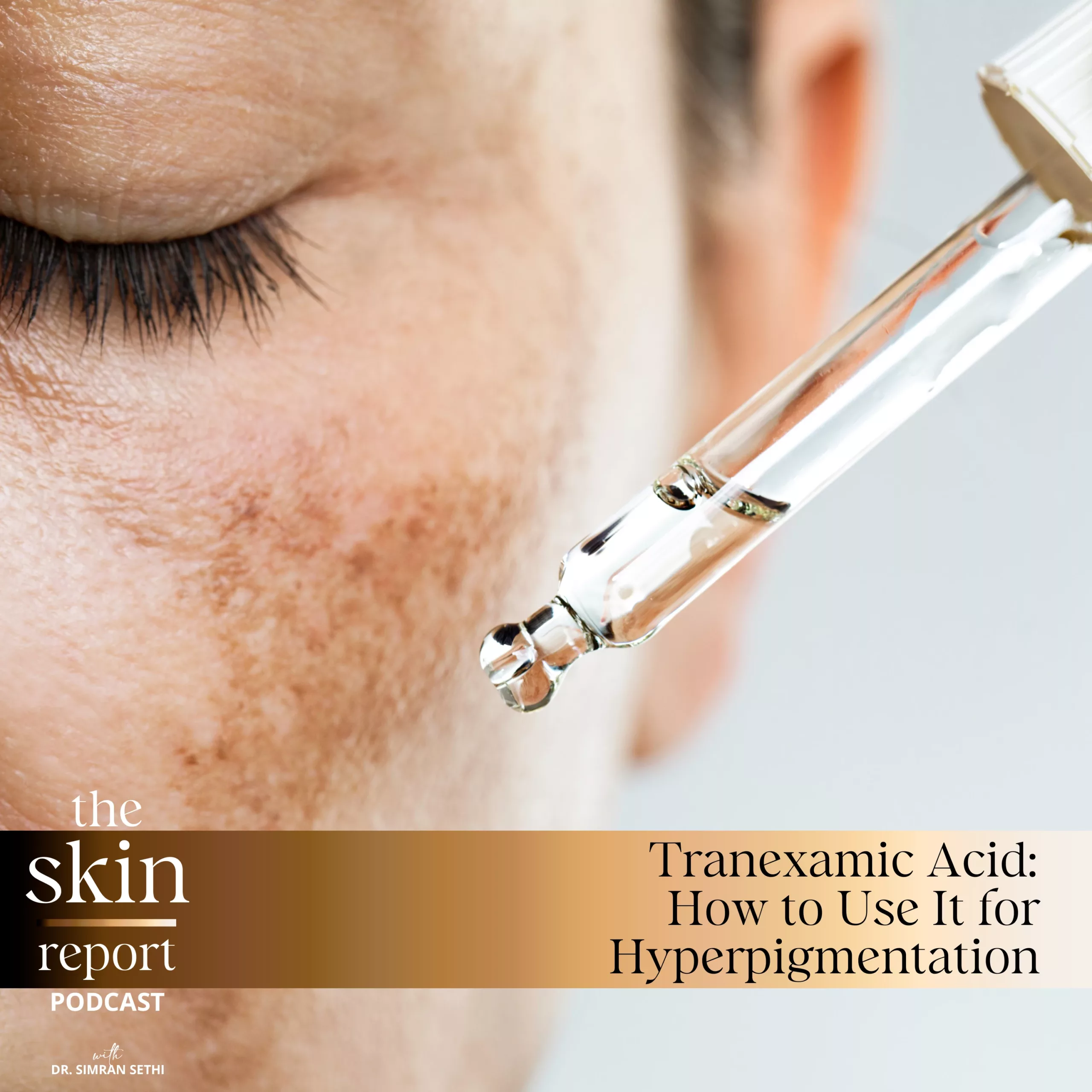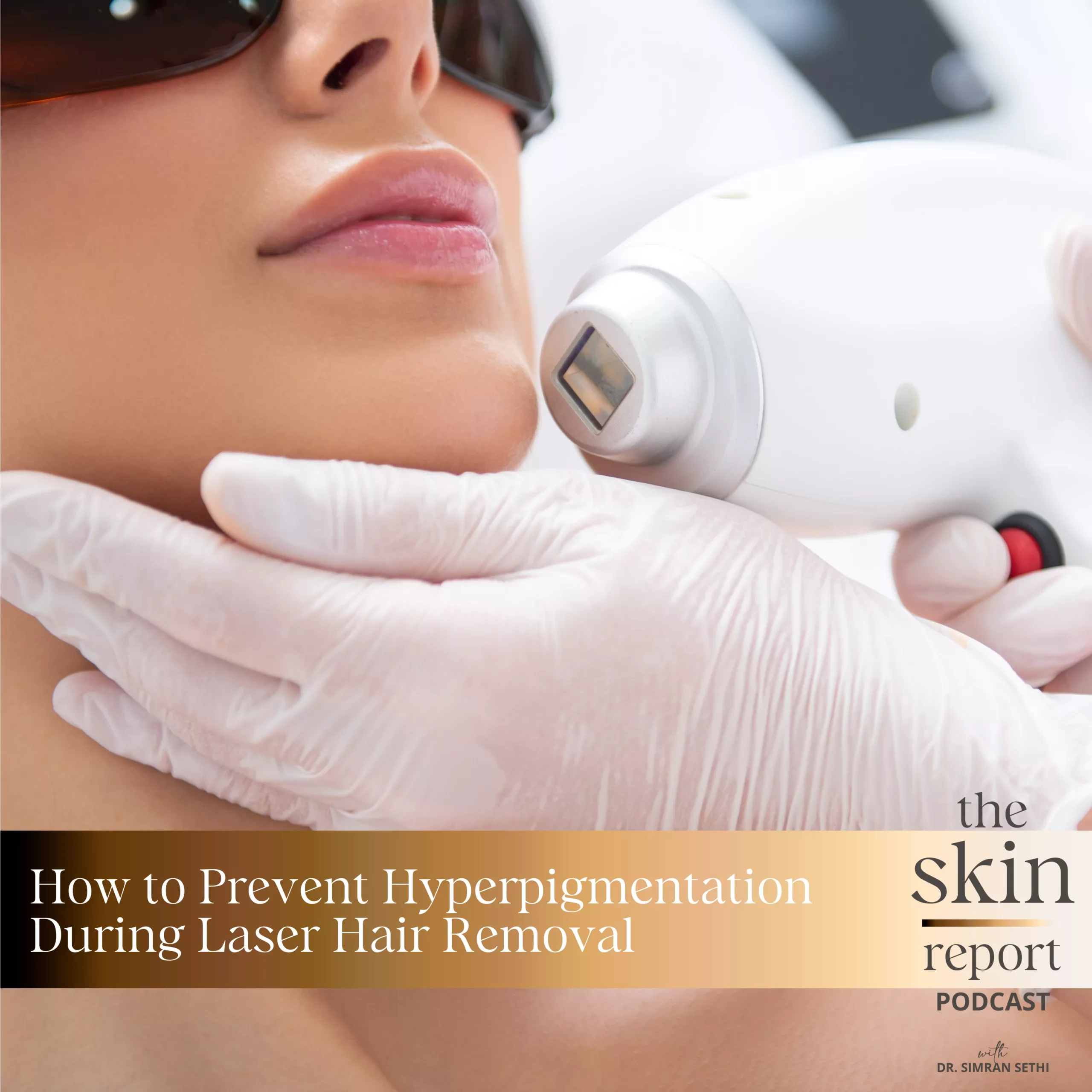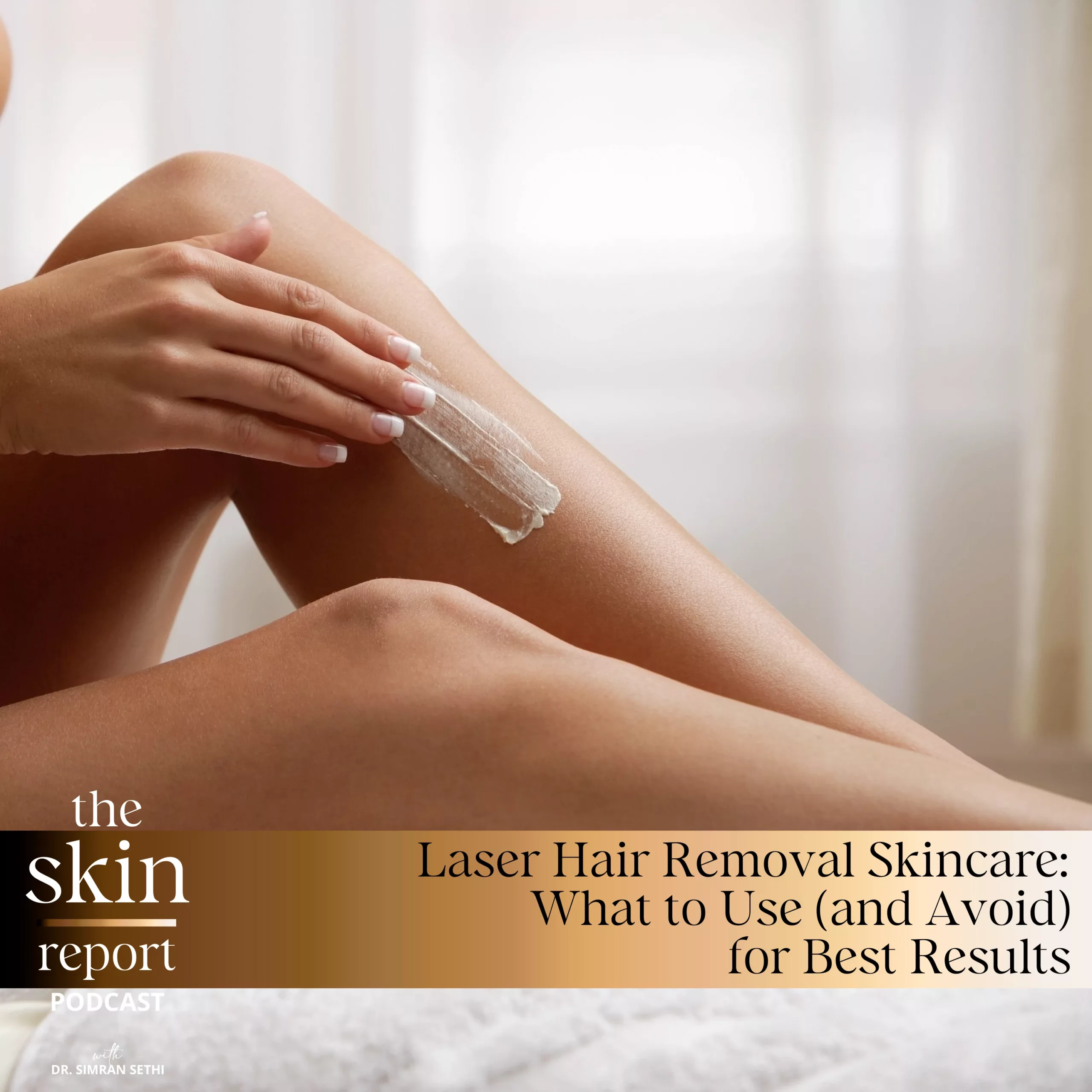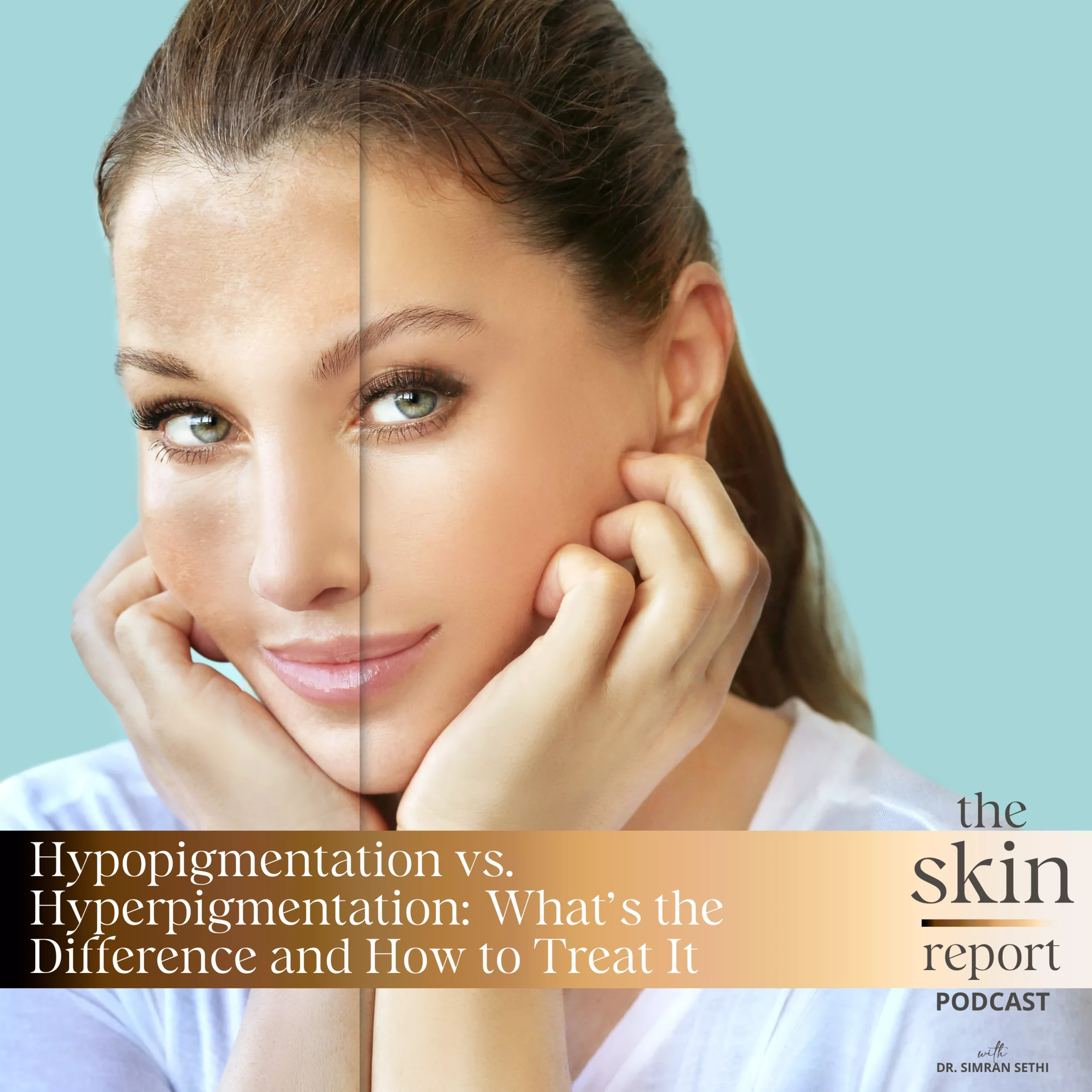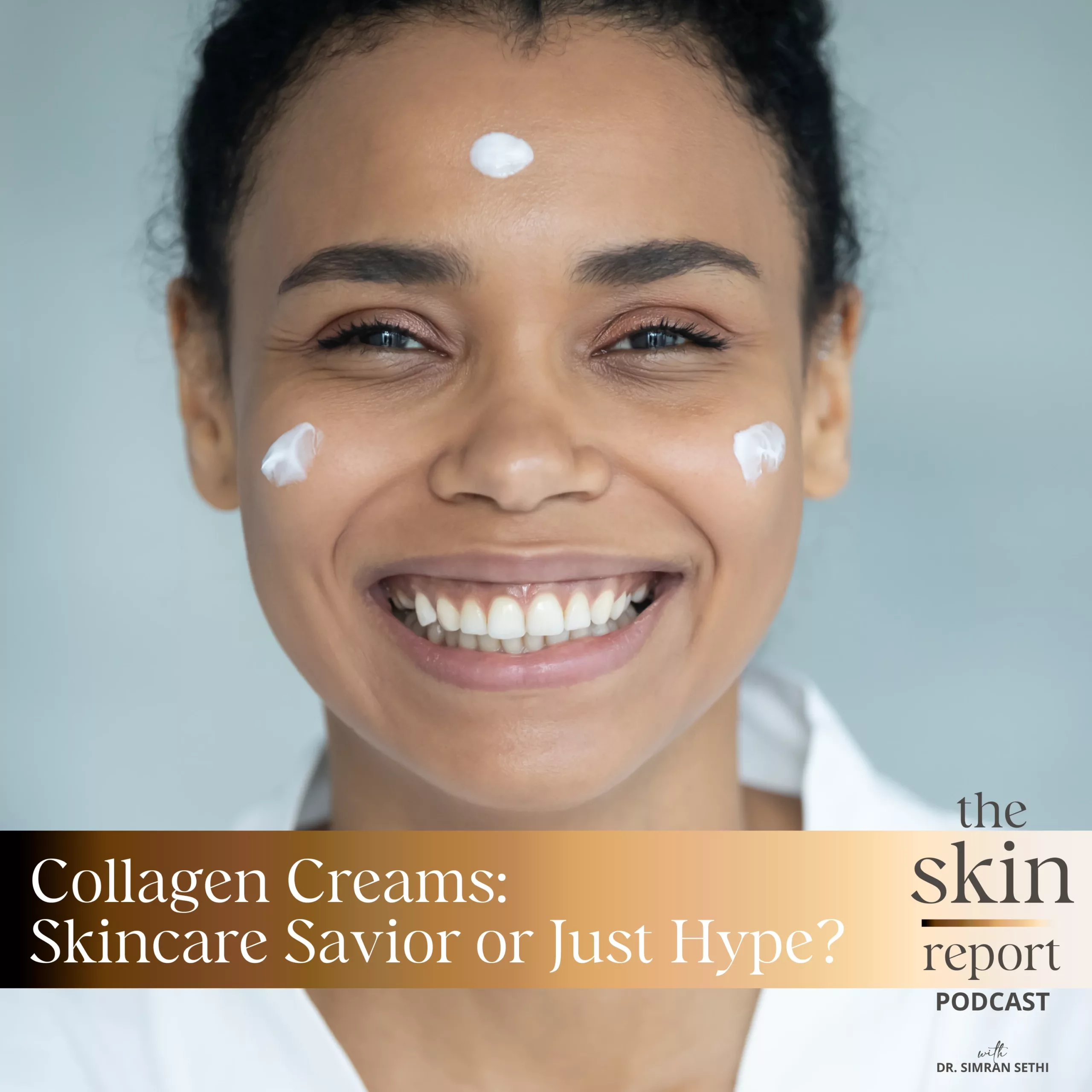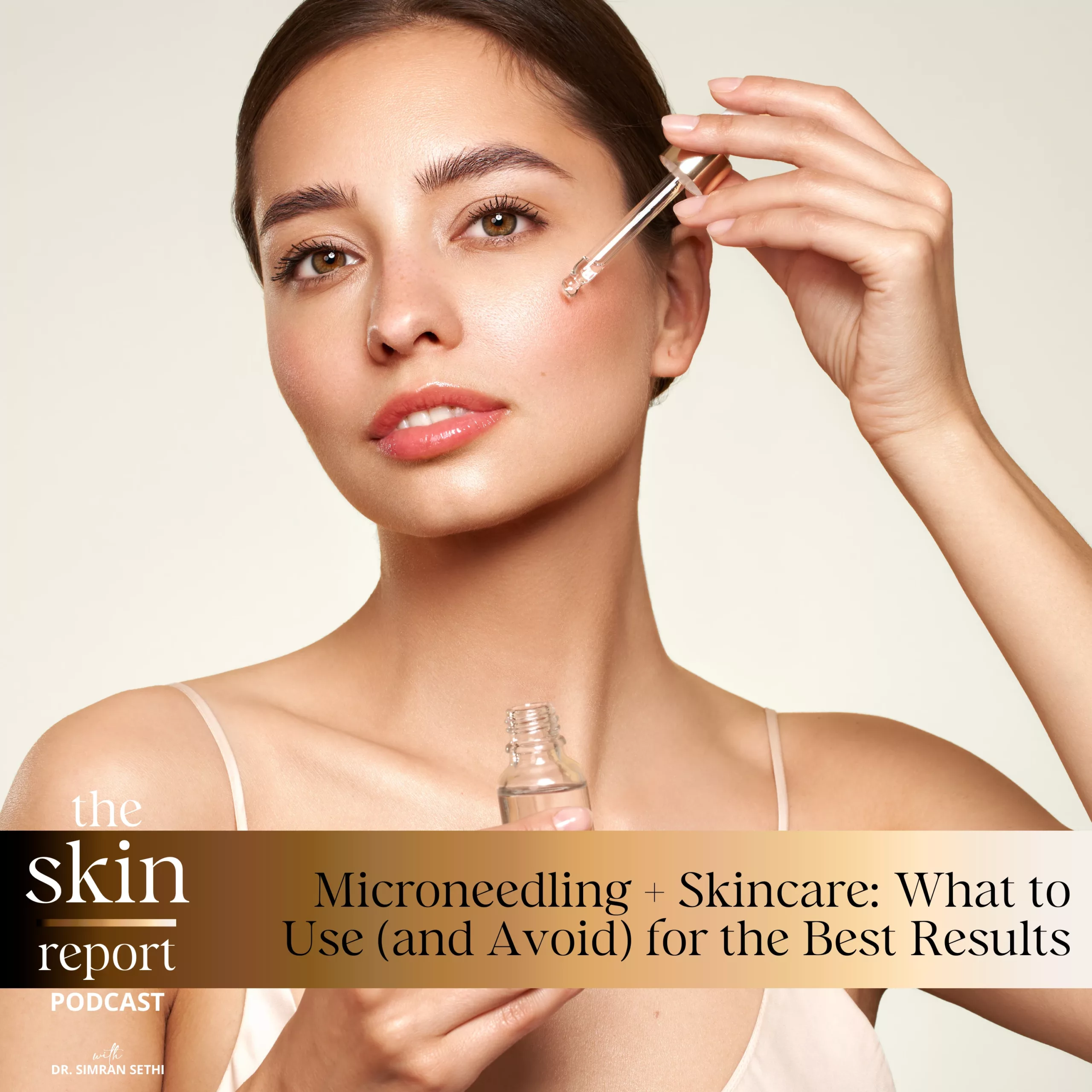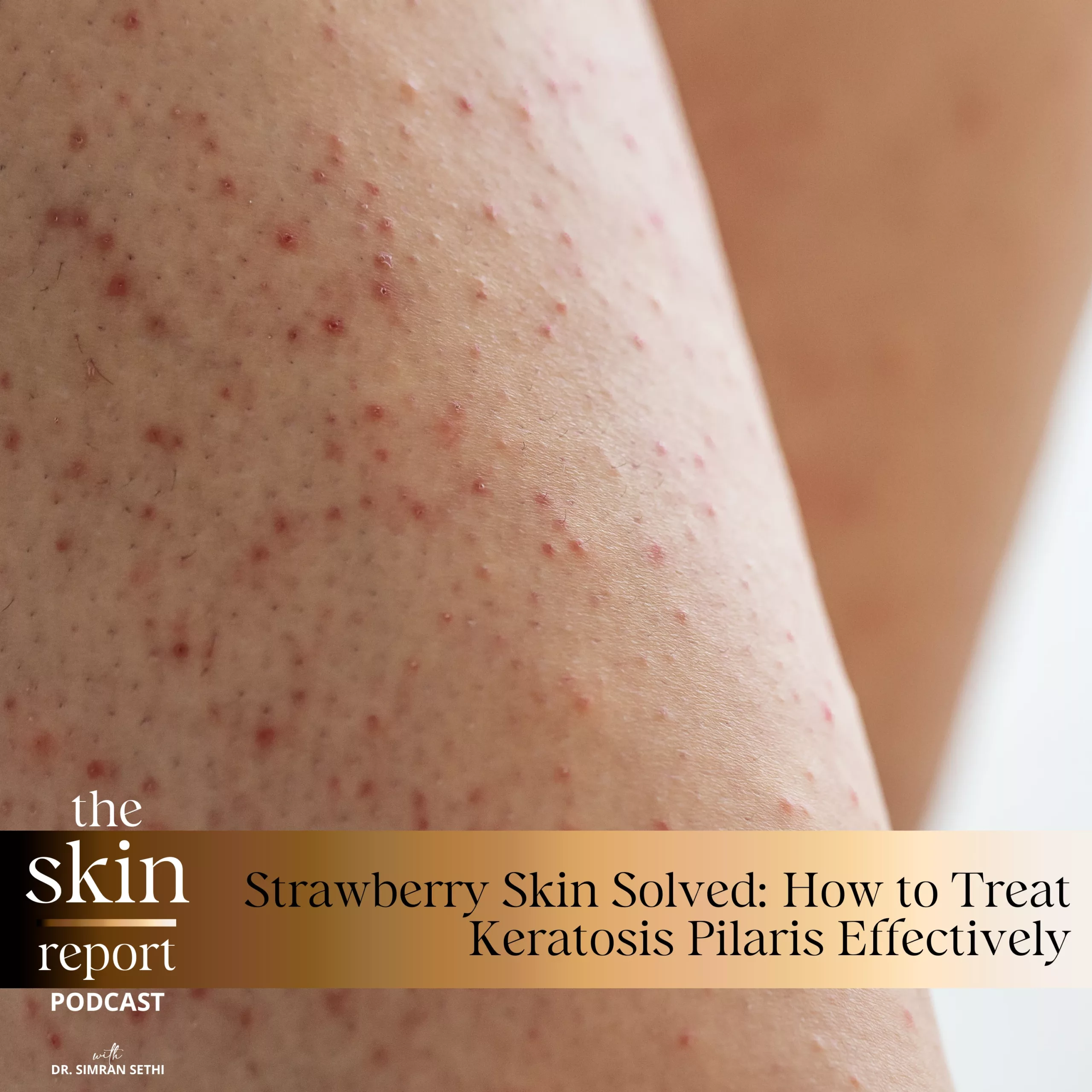If you know anything about skincare, you know that products are often formulated to address specific concerns, with labels advertising treatment descriptions like “for dry skin,” “for acne-prone skin,” and “for mature skin.” But why is it that the beauty industry rarely addresses the individual skin care needs of women of color? As it turns out, ethnicity plays a significant role in determining the best skin care treatments for different people.
The Skin Report is a new podcast aimed to shed light on how skin care practices can improve skin health for people of every ethnicity. In this first episode, host Dr. Simran Sethi discusses the skincare industry, its history and practices, and how the Skin Report podcast aims to educate listeners and improve skincare inclusivity for women of color. As a doctor of internal medicine and the CEO and founder of RenewMD medical spas, Simran has clinical and personal experience in skincare and tracking down the best skin treatment plans for each unique patient.
Follow and DM a question for Dr. Sethi to answer on The Skin Report Podcast: RenewMD
Beauty Instagram: https://www.instagram.com/renewmd_beauty/
RenewMD Beauty Medical Spas, California: https://renewmdwellness.com/
https://www.superdrug.com/dgfs/shades-of-beauty
https://www.jaad.org/article/S0190-9622(20)32421-X/pdf
https://www.dermovia.com/blogs/news/skin-cycle-happier-healthier-skin
https://thephotostudio.com.au/all/inspiration/why-diversity-beauty-industry-important/
https://www.bustle.com/style/diversity-gap-in-skin-care-bipoc-representation-dermatologists
This transcript was exported on May 13, 2022 -view latest version here.
The Skin Report Episode 1
Skin care can sometimes feel overwhelming, whether it’s finding the right products, ingredients, or treatments there’s a lot out there, but not always for women of color. That’s why I set out to educate myself and others so that we can all feel beautiful in our skin.
Hello, and welcome to the Skin Report. I’m Dr. Simran Sethi, an internal medicine doctor, mom of three, and CEO and founder of RenewMD Medical Spas, and Skin by Dr. Simran Sethi.
This is our very first episode. For our very first episode. I’d like to delve into the history of the skincare industry, my philosophy, and what I’m doing to shake things up
While there are some truly incredible people and products out there. The skincare industry has not always been inclusive to women of color. Beforewe go further, I want to establish from years of clinical experience in lifestyle and skin health that just like age and skin type, ethnicity can play a big role in finding the best skincare treatments for patients.
In essence, different ethnicities require different skincare. So in order for everyone to find the best skincare for them, there needs to be skincare for everyone. But is there? Zooming out a little I think it’s important to establish that the skincare field falls under the larger umbrella of the beauty industry. And unfortunately the beauty industry has been rooted in pushing certain ideals for a long time.
These beauty ideals rarely include women of color. In 2016, Superdrug a UK based health and beauty company surveyed women of color about their buying experience. Their research found that 70% of Black and Asian women feel that mainstream brands do not provide products for their beauty needs.
While more brands have become more inclusive in recent years, we can still see women of color being neglected, even from the very beginning of the product development phase, which is the testing stage where brands have a huge opportunity to perform clinical studies on how, and if, their skincare products impact skin tones differently.
In 2020, the Journal of the American Academy of Dermatology, or JAAD, did a quantitative analysis of research conducted with skin of color in mind. The JAAD discovered that across 58 US skin studies over 20 years, almost 75% of participants were white. The JAAD also amalgamated several studies to determine that the top three most common dermatological complaints in women of color are acne, dyschromia, and atopic dermatitis.
The JAAD was unable to find any studies of large peer reviewed research on these conditions for women of color, specifically. Of the 70,000 studies conducted on these complaints, only 1.6% included skin of color in clinical studies. How can women of color find skin care products that work for them if there are no studies even done for them? Don’t worry, thereis good news coming, but first I want to share a little bit of my story with you.
You’re listening to this podcast, because you want to learn more about how to make your skin, quite simply, glow. And everyone deserves to have glowing skin and to feel absolutely amazing in it. But how did I end up here, hosting this podcast about skincare specifically for women of color? Well, it all started when I was a young mom in medical school at the Medical College of Wisconsin.
I had struggled with acne as a teenagerand even though my acne had mostly cleared by my early 20’s, I still had scarring and dark spots that made my skin look dull and uneven. Back then in the early 2000’s every skincare brand that catered to me through magazines, retail stores, or even onlinewas completely unrelatable. I only saw brands representing lighter skin tones, offering solutions for anti-aging, or clearing acne, but no one was offering anything for someone with a more melanated skin tone, like mine, who no longer had acne, didn’t struggle with wrinkles, but needed to clear dark spots and scars.
Needless to say, this was a frustrating experience. And as I got older, and even spoke to my peers in dermatology, I was repeatedly told that dark spots or hyperpigmentation from acne was one of the most common issues, men and women with my skin tone experience.However, there aren’t any skincare solutions or medical grade procedures for our skin issues, and that we really just have to live with it and learn how to effectively cover our skin issues up with makeup.
Over time, I got increasingly frustrated with that response. Not because of how many times I’d heard it, but also because of the fact that there has been a massive growth in new skincare brands in the last decade. And yet none of them offer a solution, specifically for skin of color.
Being a mother of three teenage kids, I could see firsthand the negative effect skin issues have on children’s confidence, which again, made me feel puzzled and frustrated at the fact that with such great advancements in skincare, technology, and medicine, why were darker skin tones still not studied and represented?
I decided that this was a problem, a problem I could one day fix. I completed my internal medicine residency at Santa Clara valley Medical Center in San Jose. Being an internist for 16 years, I saw firsthand how to optimize health from the inside out. Eventually out of my personal interest in skincare and beauty, I had researched so many products and treatments that I realized my passion for the medical aesthetics field and in 2018, I founded RenewMD Medical Spa.
An aesthetics medical practice that focuses on medical grade treatments, and skincare, by promoting and nourishing the skin renewal cycle. To address and correct the most common skincare issues darker skin tones face. Today, RenewMD has three locations in Northern California and we have the privilege of working with thousands of clients with all skin tones, but largely clients with darker skin tones.
So what is the skin renewal cycle and why is it so important? Simply put the skin renewal cycle is the natural process of new skin cells replacing dead ones after a certain time period. When you are around your 20’s this process takes about three weeks. By the time you reach your mid 30’s, your renewal cycle has extended to around 28 days. The cycle will slow to 45 to 60 days in your 40’s and 50’s.
My approach to skincare is to create treatment plans with the renewal cycle in mind, and to better understand that we must first understand the different layers of the skin, the epidermis, the dermis, and the hypodermis.
The epidermis is the thinness and outermost layer of skin. It is made up of four layers of its own, but that is something we will go more into depth in a later episode. The superficial cells of your epidermis replace around every 28 days.
The dermis is the middle layer of skin. It is full of blood vessels that move oxygen and nutrients throughout the body. This layer of skin contains collagen as well as elastin. Collagen and elastin are well known skin proteins, each of them having its own properties. Collagen is important for the integrity and strength of the skin while elastin gives skin its bounce and elasticity.
The hypodermis consists of connective and fatty tissues. As you age, the fatty tissue in your hypodermis begins to decline leading to skin sagging. For people of color, the skin renewals process requires safe and specialized care. Darker skin and concerns for darker skin are often underdiagnosed and overlooked by medical practitioners and skin care companies.
In order to truly address skin conditions and treatments, and leave your skin glowing, we need to make sure all three layers of skin are healthy and happy, so that you can feel healthy, happy, and beautiful.
If you’d like to learn more about how to treat your skin type or are simply curious about aesthetic procedures, please subscribe to the Skin Report so that you know when we release new episodes. Next week, we will be covering what melanin is and what it does.
Everyone deserves to be educated, empowered, and radiant, and that begins with your skin. If you have a skincare question, please DM me at renewmd_beauty, and I will answer it in our next episode. Thank you for listening.
Transcript by Rev.com


